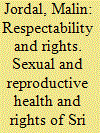|
|
|
Sort Order |
|
|
|
Items / Page
|
|
|
|
|
|
|
| Srl | Item |
| 1 |
ID:
191958


|
|
|
|
|
| Summary/Abstract |
This article studies Sexual and Reproductive Health and Rights (SRHR) at the United Nations (UN). SRHR, a gender equality norm that applies human rights to sexuality and reproduction, have traditionally been supported by a network of actors led by the United States (US) and the European Union. Nevertheless, a rival network has contested SRHR since their conception in the early 1990s. We study the robustness of SRHR in five UN fora between 2009 and 2020, focusing on actor constellations, productive power and norm concordance. Between 2009 and 2016, the normative status quo was maintained, except in the Human Rights Council and the Security Council. In 2017, the US joined the network of rivals and accelerated the norm’s weakening in the Security Council and the Commission on Population and Development. However, to weaken or strengthen the norm further, both networks see a need to address SRHR outside the UN.
|
|
|
|
|
|
|
|
|
|
|
|
|
|
|
|
| 2 |
ID:
171863


|
|
|
|
|
| Summary/Abstract |
Women in prostitution are often disrespected and subject to health risks. The aim of this study is to explore how women formerly engaged in prostitution in Sri Lanka position themselves in relation to gendered norms of respectability, and to discuss the possible implications for their sexual and reproductive health and rights (SRHR). Semi-structured qualitative interviews were conducted with fifteen women formerly engaged in prostitution. Discourse analysis was used to identify and describe interpretative repertoires and four repertoires were identified: Victimhood, Resistance, Responsibility, and Independence. The first three were drawn upon to construct their identities in line with norms of female respectability, as the women emphasised being victims of unfortunate situations, resisting sexual disrespectability and taking responsibility for their children and others. The last repertoire deviated from the respectability norm as it conveyed a picture of the women as independent, strong and courageous subjects, characteristics more in line with male respectability in Sri Lanka. Despite marginalised and oppressive circumstances, the women drew on interpretative repertoires to enhance access to respect, dignity and resources. However, their vulnerability to violence, SRHR risks and virtual absence of rights leave them with little access to resources that could enable a healthier and better life.
|
|
|
|
|
|
|
|
|
|
|
|
|
|
|
|
|
|
|
|
|